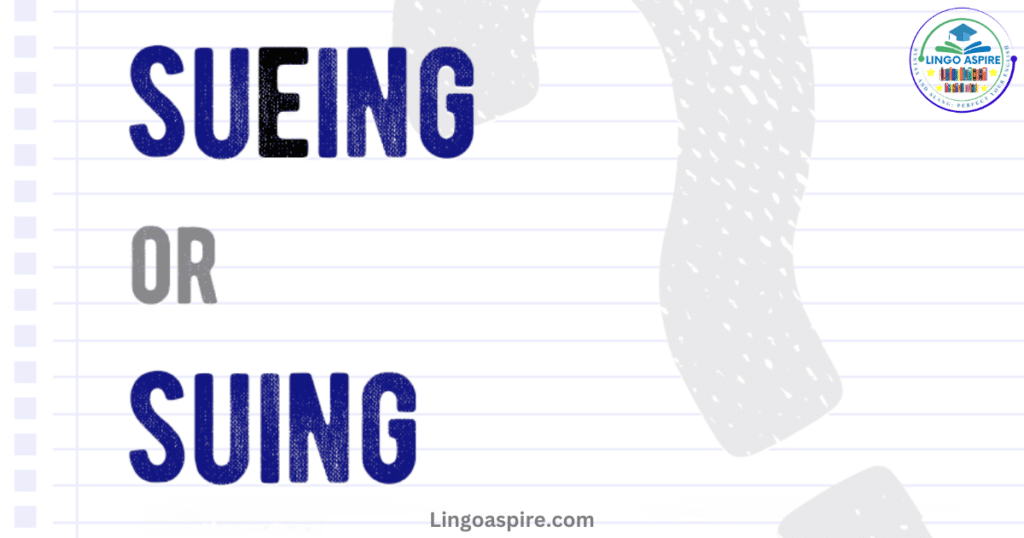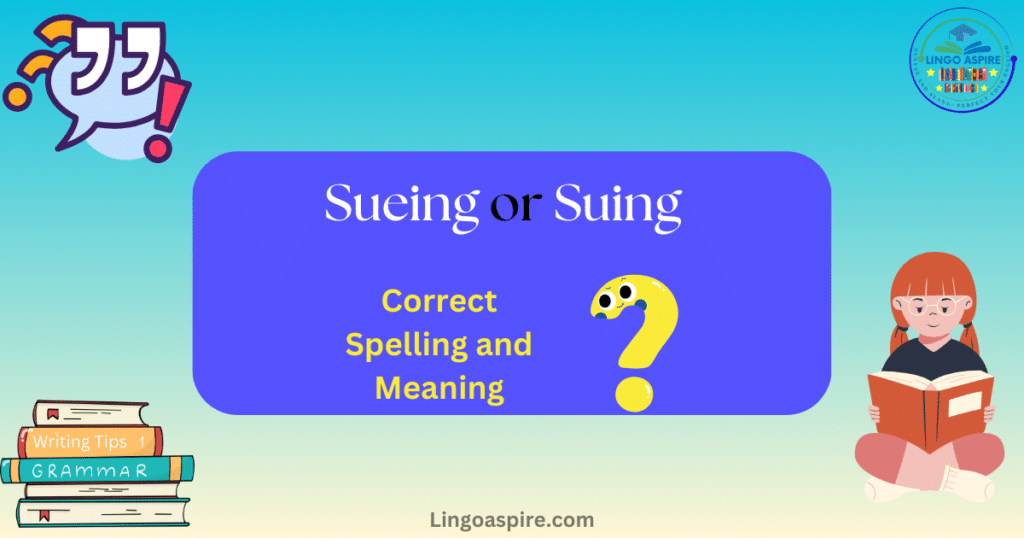When understanding the correct spelling of suing, many people often stumble. The confusion between sueing or suing is common because of how English grammar rules work. This article will help you learn the difference between suing and sueing, explain the suing meaning, and provide practical suing examples. By the end of this post, you’ll feel confident in using this word correctly, whether in legal contexts or daily conversations.
Sueing or Suing: Which Spelling Is Correct?

The correct spelling of suing is straightforward: it’s spelled suing. The misspelling sueing often happens because people assume the silent “e” in the word “sue” needs to stay when adding “-ing.” However, according to English grammar rules, when you add “-ing” to a verb ending in “e,” the “e” is usually dropped. This is why “sue” becomes suing, not sueing.
Let’s look at an example of how this works with other words:
| Word | Adding “-ing” | Correct Form |
|---|---|---|
| Make | Making | Correct |
| Bake | Baking | Correct |
| Sue | Suing | Correct |
The only time the “e” is kept is when removing it would change the word’s sound, such as in “seeing” or “agreeing.” For “sue,” dropping the “e” corrects the pronunciation.
What Does Suing Mean?
The suing definition is simple. It refers to filing a lawsuit or starting the litigation process in a court of law. When someone is suing another person or entity, they are seeking compensation or justice for a perceived wrong, breach of contract, or violation of their rights.
For example, if a company fails to deliver a product you paid for, you might consider suing them to recover your money. This legal action is an essential part of the judicial system and ensures that disputes are resolved fairly.
The term suing is widely used in both formal and informal contexts. For instance:
- In formal legal settings: “The plaintiff is suing the defendant for damages.”
- In casual conversations: “He’s suing his landlord over unsafe living conditions.”
Why Is “Sueing” Incorrect?
The spelling sueing doesn’t follow proper English grammar rules. While it might look logical to keep the “e” in “sue,” it’s not correct. This is one of the common mistakes in spelling that occur due to phonetic confusion.
Using sueing in writing can make your work look unprofessional. It’s important to avoid spelling errors, especially in legal documents or formal communication. Proofreading and using tools like grammar checkers can help you catch these mistakes.
Synonyms for Suing
If you want to avoid repetition, there are several synonyms for suing you can use. These words carry similar meanings and can be used interchangeably depending on the context:
- Filing a lawsuit
- Litigating
- Prosecuting
- Taking legal action
- Pursuing a claim
For example:
- Instead of “He is suing the company,” you could say, “He is filing a lawsuit against the company.”
- “The victim plans on prosecuting the accused in court.”
Using proper legal terms not only improves your vocabulary but also ensures clear communication in legal settings.
Examples of Suing in Sentences
To better understand how to use suing in context, here are some examples:
- “The musician is suing the record label for unpaid royalties.”
- “The customer decided to file a lawsuit after being injured by the defective product.”
- “She is suing her former employer for wrongful termination.”
These sentences highlight how the word suing fits into everyday language, particularly in court-related terminology.
Grammar Rules for Spelling Suing
The rule for spelling suing is part of a larger set of English language tips related to verbs ending in “e.” Here’s how it works:
- Drop the “e” if the suffix starts with a vowel, such as “-ing” or “-ed.”
Example: Make → Making - Keep the “e” if dropping it would change the pronunciation.
Example: Agree → Agreeing
Understanding these rules can help you avoid spelling variations and other errors when writing.
Usage of Suing in Different Contexts

The word suing is widely used across various contexts, from everyday conversations to professional legal documents. Understanding its correct usage in writing and speaking can help avoid errors and ensure clarity. Below, we’ll explore how suing fits into different scenarios and provide helpful examples for practical use.
Suing in Legal Contexts
In legal terminology, suing refers to initiating the litigation process by filing a case in court. It is most commonly used when one party seeks compensation or justice for a perceived wrong, whether it’s a breach of contract, defamation, or personal injury.
For example:
- “The company is suing the supplier for failing to meet contractual obligations.”
- “She decided on suing her neighbor after the property dispute escalated.”
In such cases, the plaintiff (the person or entity suing) must provide evidence supporting their claim, while the defendant defends their position. Suing is integral to the judicial system, ensuring accountability and fairness.
Suing in Everyday Conversations
Outside of legal contexts, suing is often used in casual discussions to describe someone considering or threatening to take legal action. It might sound less formal but still conveys the same meaning.
For example:
- “If they don’t fix the damage, I’m thinking about suing.”
- “He’s not suing; he’s just trying to scare them.”
This usage reflects how legal terms like suing have become part of the common language, even for non-legal professionals.
Suing in Literature and Media
In literature and media, suing often symbolizes conflict, power dynamics, or the pursuit of justice. Authors use it to illustrate characters’ struggles with societal systems or personal grievances.
For example:
- In Harper Lee’s To Kill a Mockingbird, legal action (though not explicitly referred to as “suing”) plays a central role in addressing racial injustice.
- Headlines such as “Celebrity X Is Suing for Defamation” capture public interest and reflect real-world legal disputes.
This broader cultural usage shows how the concept of suing resonates beyond the courtroom.
Proper Usage Tips
- Stick to Correct Spelling: Always use suing and avoid the misspelling sueing.
- Understand Context: Use suing when discussing formal legal action or metaphorically in casual contexts.
- Use Synonyms When Appropriate: For variety, phrases like “filing a lawsuit” or “taking legal action” can be substituted.
For example:
- Instead of “He is suing the company,” you might say, “He is filing a lawsuit against the company.”
By mastering the correct usage of suing, you’ll improve your writing and speaking accuracy, whether drafting a legal memo or chatting about recent events.
FAQs About Suing
- Why do people spell it as “sueing”?
Many people mistakenly believe the “e” in “sue” must stay, but sueing is incorrect. - Is “sueing” ever correct?
No, “sueing” is never correct in English. - How can I avoid spelling errors like this?
Always double-check grammar rules and use online tools or dictionaries to verify your spelling.
Conclusion
The correct spelling of suing is an important detail that many people overlook. While sueing might seem like a logical variation, it’s not accurate according to English grammar rules. By understanding the suing meaning, following proper spelling guidelines, and practicing its usage, you can write with confidence in both casual and legal contexts.
Remember, whether you’re talking about filing a lawsuit or discussing legal issues, using the right word matters. If you’re ever unsure, tools like spell checkers and grammar resources can be invaluable.
Let this be your guide to mastering the correct spelling and usage of suing. Stay confident, write clearly, and avoid common mistakes in spelling.
Sources
- Merriam-Webster Dictionary
A reliable dictionary source for definitions, correct spellings, and examples of words in context. - Cambridge Dictionary
A trusted resource for English language learners, providing in-depth explanations of word meanings, grammar rules, and usage examples. - Cornell Law School – Legal Information Institute (LII)
Offers detailed explanations of legal terminology and processes, including terms like suing, litigation, and filing lawsuits.







